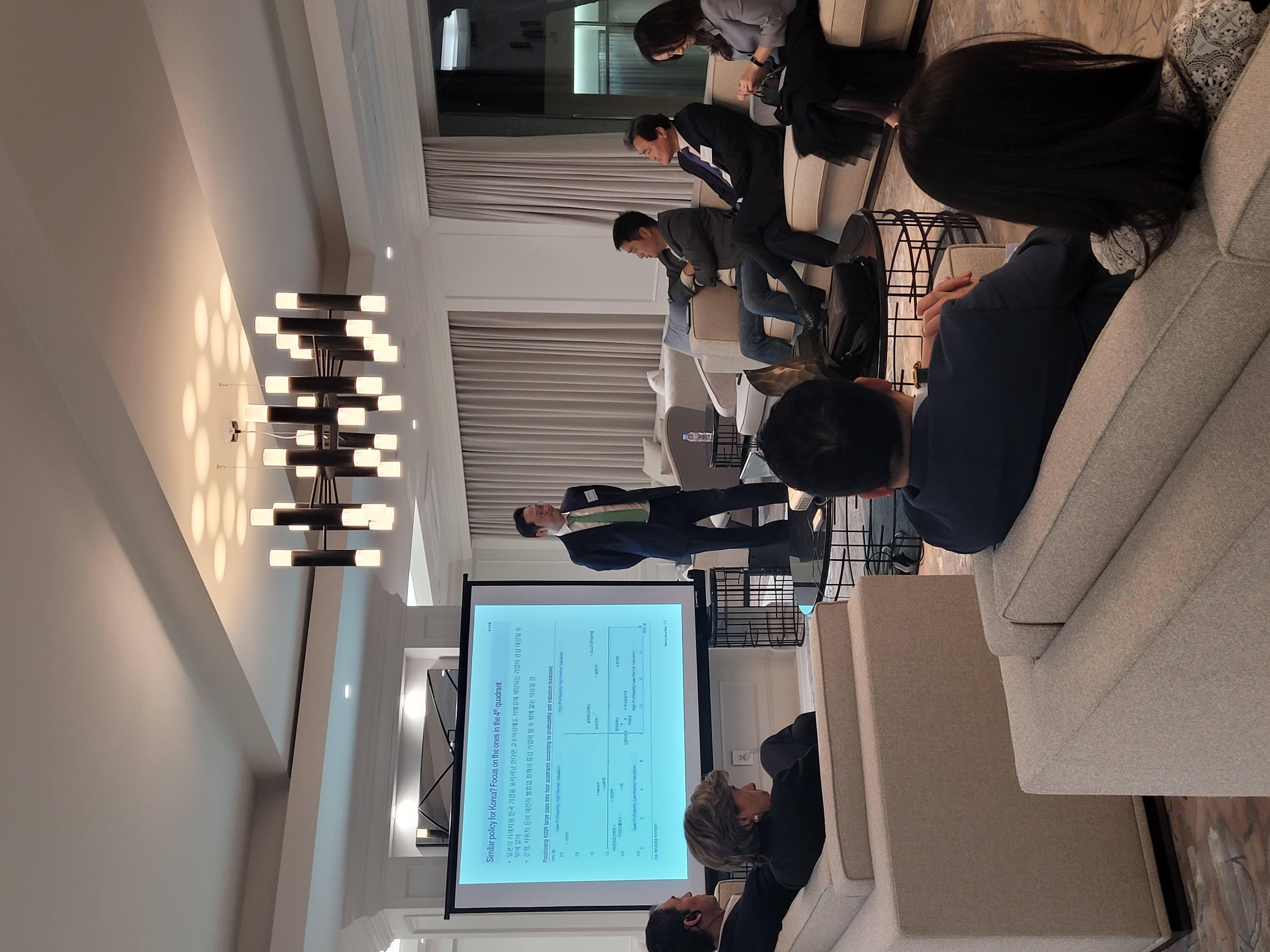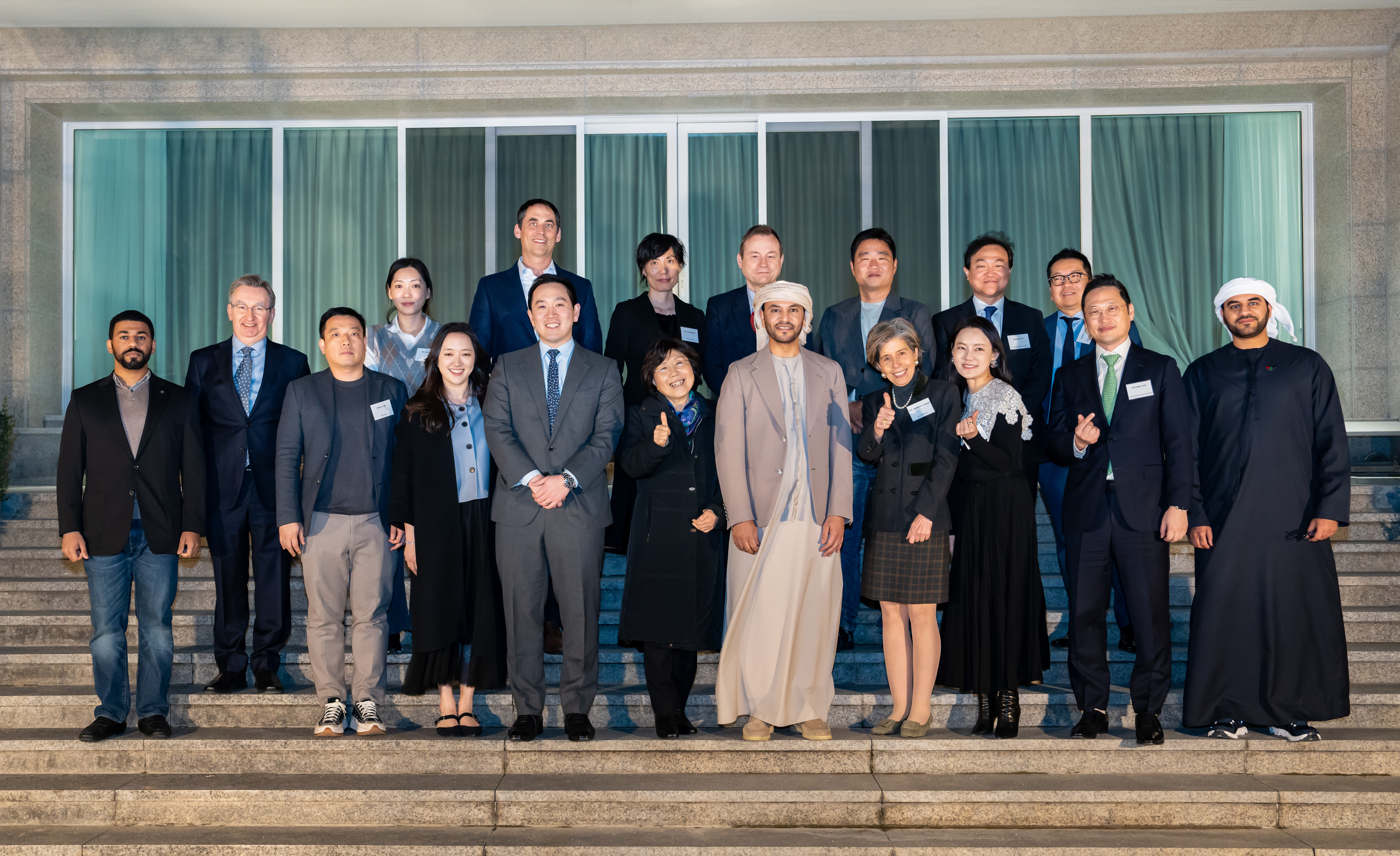
Home > CICI News > What’s New

| Title | Korea CQ - 'Reflection of Future: Stock Market Perspective' Special Lecture by Kyungsu Lee, Head of Research at Meritz Securities | ||||
|---|---|---|---|---|---|
| Posted by | webmaster | Hit | 58 | Date | 2024.03.22 |
| Files | |||||
Dear Korea CQ members, On March 19th, a special lecture on 'Reflection of Future: Stock Market Perspective' by Kyungsu Lee, Head of Research at Meritz Securities, was held at the UAE Ambassador's residence. 
H.E. Abdulla Saif AI Nuaimi, H.E. Ekaterini Loupas, H.E. Georg Schmidt, Brian Payne, Youn Jung Park, Joseph Young, Youngha Go, Kyungsu Lee, Soong Ki Yi, Young Jin Oh, Hyun Bin Kim, Michelle Kim, Min Joon Kim, Min Jee Kim, Choi Jungwha, and Didier Beltoise attended this forum. 
Ambassador Abdulla Saif AI Nuaimi warmly welcomed everyone and we took time to watch some videos that introduced the UAE. 
Members enjoyed a delicious buffet and apricot juice prepared with great care by the Ambassador. 
Kyungsu Lee 's lecture on 'Reflection of Future: Stock Market Perspective’ started after the dinner. Kyungsu Lee was selected as the Youngest & Longest running Best Investment Strategy Analyst and serves as an External member of the National Economy Advisory Committee under the direct control of the President and Advisory Board Member for Foreign Currency Asset Management, Bank of Korea. 
Participants all asked many questions after the informative lecture. 
We then had dessert time in the garden of the residence of the UAE Ambassador. 
We would like to thank Kyungsu Lee for his lecture, and H.E. Abdulla Saif AI Nuaimi for his warm hospitality. We'd also like to thank all members who attended, and Min Jee Kim for her interpretation. 
Please click the link below for more pictures https://photos.google.com/album/AF1QipPq38kdKg70yHsmJDUlJQ2E-l20PTSQhpqb8F0k 'Reflection of Future: Stock Market Perspective' Kyungsu Lee, Head of Research at Meritz Securities PART1: Why is the stock market rallying? Immediately after the COVID-19 pandemic swept the world, everyone was concerned about a great recession in the global economy. However, the Great Depression in the United States in 1929, the financial crisis in 2008, and the COVID-19 pandemic are completely different. The Great Depression and the financial crisis were caused by certain people, and it took quite a long time to recover, so the economy was bound to fall into a long-term recession. However, the COVID-19 pandemic was a force majeure crisis that was not anyone's fault. Therefore, even if the government boldly implemented fiscal expenditures, there was no one to oppose and it was a crisis that could be recovered in a short period of time because it was not a debt adjustment that required restructuring. With the pandemic came massive inflation. As the United States steeply raised interest rates, U.S. consumer prices rose 9.2% in June 2022. It was the highest inflation rate in 40 years. It was a very jarring situation because interest rates were always low. At the time, there was a lot of debate about whether raising interest rates would stabilize prices, but I predicted that this would be enough to resolve supply chain disruptions and put the chaotic society back on its feet, and that prediction was correct. If you look at the chart of the S&P 500 index, a stock index representing the U.S. stock market, you can see that the index has been rising for 15 years since 2009, right after the financial crisis. Why is the U.S. stock market still reaching an all-time high despite all the challenges, such as the European financial crisis, conflict between the U.S. and China, COVID-19, interest rate hikes, skyrocketing prices, the Russo-Ukrainian War, and the Israeli–Palestinian conflict? First, it cannot be said that stock prices rise because the economy is good. This is because the low growth trend had already continued even before the outbreak of the COVID-19 pandemic. The interpretation of the daily stock market on Wall Street in the United States is always as follows. "On Wall Street today, news of lower interest rates sent the stock market up, but then the expectation that these rates would be inflationary sent the market down, until the realization that lower rates might stimulate the sluggish economy pushed the market up, before it ultimately went down on fears that an overheated economy would lead to a reimposition of higher interest rates" In other words, these factors, such as the economy, expectations of interest rate cuts, and interest rate increases, cannot be considered the causes of the stock market continuing to grow. So, is it because too much money was released into the U.S.? This might have been the most persuasive argument, but unfortunately, other countries, such as Japan and Europe, also reached record highs in their stock markets, and despite interest rates rising at the fastest rate on record during the pandemic, stock markets continued to grow, so we need to look for other factors. The conclusions I have reached after working in the stock market for 24 years are as follows. The stock market moves when we face changes that will completely change our lives. This is not a matter of one individual's choice. The stock market moves in the long term when we face a huge flow of change that humans have no choice but to adapt to. So, what is ‘great change’? This is a change that forces us to answer the question ‘Can we live without it now?’ with a resounding ‘no’ The first huge change was the emergence of PCs and the Internet from the mid to late 90s to the 2000s. It is impossible to imagine today without the Internet. The second is China’s entry into the global economy. With China's accession to the WTO in 2001, labor force deflation occurred, and people around the world came to have at least one 'Made in China' product in every home. So, what is the third great change that has occurred in the 15 years since the Great Depression? This is the emergence of mobile phones, electric vehicles, and AI. When humans feel pain, they instinctively try to overcome it. There are many pains, but the greatest pain is the fear of one’s mortality. Pandemics that have existed throughout history are a main example of such suffering. Pandemics in the 16th and 17th centuries led to the Reformation and Renaissance, and pandemics in the 18th century initiated the Industrial Revolution. And in the 21st century, COVID-19 also brought suffering to humanity once again. It showed the world what happens when people are no longer able to work. Although there are big and small differences in each country, one thing they have in common is that there were ‘lockdowns.’ This disrupted the supply chain and caused prices to rise. Moreover, Korea has a very low birth rate of 0.6. So, Korea's population will decline at an unprecedented rate, and OECD countries as a whole will see their working-age population aged 15 to 64 peak in 2032 and then decline. This is a crisis that will cause enormous suffering to humanity. And COVID-19 showed us in advance the fears of hyperinflation, polarization, social dissatisfaction, and conflict between countries, and humanity has come to realize that if we are not prepared, something big will happen. But this fear is also an opportunity for industrial capitalists. Capital will go to those who want to end fear. Therefore, the reason why the stock market is booming despite various crises is because industries that are willing to use human labor to bring about huge changes in this society constantly emerge. Therefore, of course, we cannot say that the stock market is over because this flow of change has not ended. So, when will the stock market's growth trend end? It will be when today's trend-leading AI engineers have no more work to do. Then, stock prices will fall because our lives will have completely changed. The ‘mobile phone’ change cycle mentioned earlier can be seen as already over. Smartphones are no longer profitable because everyone has one now. The ‘electrical vehicle’ change cycle is ongoing now. There is a fierce battle between various electrical vehicle companies in the market, and the winner will reap very high profitability. This was a phenomenon that could also be seen in smartphones. In the early days of smartphones, various companies such as Sony and Blackberry jumped into the market, but currently only a few companies, including Apple, Samsung, and several Chinese companies, have survived. The third is the ‘AI’ change cycle. The emergence of ChatGPT last year had great significance. It doesn't really matter whether ChatGPT can answer correctly or not. When you use ChatGPT, that data continues to accumulate. The most important thing is that ‘it was used by everyone as least once.’ This is popularization. If everyone uses it once, that data will lead to an incredible speed of development and will soon change our world. Popularization is achieved when something is easily accessible to people. So, what other pains will the AI revolution bring? It's a lack of power. Data centers require enormous amounts of power, so they are all located next to nuclear power plants. Therefore, many leading big tech companies are all equipped with small nuclear reactors (SMRs). Smartphones are now part of our daily lives, and people no longer wave their hands to catch a taxi. We reserve a taxi using the Kakao Taxi app, and even when we need to buy something, we order it through online platforms like ‘Coupang’ or ‘Amazon’ rather than going directly to the store. How will AI change our lives? Robots will soon replace human labor. Therefore, we must prepare for a society where the working population will disappear. We need to invest in industries that prepare for this society. Not all stocks and companies can be good. Only industries and companies that will change the world will survive and emerge again. I think it is important to look at changes from the perspective of an ‘interconnected world’. The transportation revolution first connected the world. The advent of the automobile connected cities to cities, and the Internet has since greatly enhanced this connectivity. Because it is a connection without wires, it has become possible to achieve extensive connectivity, such as connecting countries. This network will bring about much greater change than before, and each industry entity is creating various cycles in each era. The ‘mobile phone’ change cycle is over, ‘electric vehicles’ are in progress, and ‘AI’ is just beginning. Because our lives have not completely changed yet, new things such as robots, autonomous driving, and UAM will continue to emerge. PART2: ‘Value Up Program’ and Korean stock market In particular, the Korean stock market is not moving forward. When looking at ROE (Return On Equity), it is 20% in the United States but less than 10% in Korea. This is because the cost of borrowing money is similar to COE (Cost Of Equity), so there is not much margin left. So, what should we do to overcome this? If you analyze ROE using DuPont Analysis, you will get a simple formula consisting of the following three factors. It is ‘ROE = Net Profit Ratio (Margin) x Total Asset Turnover (Asset Efficiency) x Leverage (Investment, Shareholder Return)’. Net profit ratio is commonly known as ‘margin’. ‘Total asset turnover’ refers to the activity of a company that works hard to sell a lot of good products. The last ‘leverage’ is the ratio of debt to equity capital. Let's talk about the UAE for a moment. The ROE is very high at 16%, but I wonder why the PDR (Price to Dream Ratio) is undervalued. I think there might be a need to promote it or there might be some other reason why it doesn't work in the middle. Returning to Korea, the problematic point is ‘leverage’. Typically, people get scared when told to increase their debt. The economy is uncertain, so they worry about whether they can increase debt. They have a lot of cash, but they don't know what to do with it, so they end up reducing their equity capital. Korean companies often consider it a waste to buy back their own shares and then cancel them. Therefore, ROE cannot rise. Therefore, what has recently emerged is the government’s ‘Value Up Program’. The program is borrowed from Japan's policy. Japan also had a so-called ‘unresponsive’ stock market. However, the market started showing growth last year. This is because the Japanese government required companies to present management plans that take ROE and stock prices into consideration. Afterwards, companies responded, and stock prices began to rise, and the Korean government, observing this, also announced the ‘Value Up Program’ on February 26. However, problems arise because sensitive tax issues cannot be addressed. Currently, most major shareholders of Korean companies are approaching the time of retirement to pass on their wealth to their children. However, if stock prices rise too much during this period, they will have to pay a huge inheritance tax. Therefore, everyone is unanimous in not wanting the stock price to rise until inheritance. The inheritance tax rate in Korea is 50% and in Japan it is 55%. The largest shareholder in Korea can be considered to have 60%, with a 20% addition. In other words, if I inherit 100 won to my son, my son would receive 40 won, and if it is passed on again, his son will receive 16 won. If that happens, there will be no management rights. Therefore, the father continues to work and the son wants to take over the business, and the conflict that appears in dramas also occurs in real life. In Korea, 1.6% of total tax revenue is inheritance tax. In fact, it is not that much money from the government's point of view, but it is very important from the company's point of view. So, you may ask whether abolishing the inheritance tax would lead to a happy ending for everyone, but it is impossible to eliminate the system. This is because there are virtually no people who pay inheritance tax. Especially during election season, it can be a decisive factor that could result in a crushing defeat. In a vote where each person can present one vote, there are far more people who do not pay inheritance tax, so no one proposes lowering the inheritance tax rate because it would damage their reputation. Therefore, it is possible that proposals related to inheritance tax will come out in late May or June. This would be a very good time. Additionally, the ‘Value Up Program’ will revitalize activism, which is rare in Korea. In the end, companies have only two options: quit the company or work harder, so delisting and M&A (Merger & Acquisition) will increase. From this perspective, one of the most symbolic companies is Meritz Securities, where I work. I feel greatly rewarded as a Korean stock market strategist. When most companies split listings to raise funds, my company declared that it would pursue a merger and achieve a shareholder return of more than 50% over three years. Therefore, the market capitalization, which was originally 4 to 5 trillion won, has increased by three and a half times and is currently at 17 trillion won. We were anxious to see if Meritz's true activism would be heard by everyone, but the Korean stock market responded. Meritz Securities is a financial holding company without a bank. In Korea, the perception of a financial holding company without a bank may not be very positive, but Meritz recorded the third highest market capitalization after KB Financial Group and Shinhan Financial Group. It started from the recognition that the rights of a person who owns one share and the rights of the majority shareholder are the same. It started with the realization that not all of the company's cash was its own. It is expected that we will see many more phenomena like this in the future. Many people are worried that they will have to sell all their stocks and convert them into cash due to the possibility of an economic recession. But the economic downturn is not the point. What we need to keep in mind is that only companies and countries that significantly lead changes in our lives will realize a stock market boom. It may be more correct to consider who will become such companies and countries. Unfortunately, there is no history of Korean companies leading the way in changing the lives of people around the world. Although Korea does not manufacture anything such as radios or televisions, it has been able to maintain a good flow of supply. The current Korean stock market portfolio is very good. Korea is showing its presence in all fields, including secondary batteries, CMO, and semiconductors, and the situation is not bad. However, we must keep in mind that the United States is still leading changes in the lives of people around the world. Q&A Q1. At present, several wars are taking place, including the Russo-Ukrainian War, and the Israeli–Palestinian conflict. How will this affect economic trends? A1. They affect our prices because local conflicts affect supply chains. The inability to pass through the strait or skyrocketing gas or oil prices pose a threat to prices. As I said, prices affect interest rates and interest rates affect the economy, but that is not what we need to focus on. Rather, Big Tech began to threaten national power by supporting satellites in Ukraine. I’m very worried. Because private companies are collecting the data, they can have greater control than any single country. I recently went to the Las Vegas Consumer Electronics Show (CES). I test drove the Tesla self-driving FSD version 11 for three days. It was scary at first. However, thanks to the incredible technology that can be used to make unprotected left turns and turn on the blinkers just by using the navigation system, at some point I thought that if there was a self-driving Tesla on every road, I could stop worrying about accidents. The fear was gone. But what would happen if Tesla CEO Elon Musk did not activate the self-driving system for one day? Can this really be considered weaker than the control of one country? Due to these concerns, it is highly likely that national regulations will become stronger. But there are countries that are heading in a completely different direction. This is China. China does not require personal consent to collect data. Therefore, state companies are playing a leading role rather than private companies. Because China can advance at a much faster pace than other countries, China and the United States are taking cautions on each other’s data collection. Q2. You said that UAE's ROE is very high at 16%, but PDR is low. How can this be improved? A2. This part will need to be answered after analyzing the UAE situation a little more. I also wonder why the UAE has such a high ROE but low PDR. I want to analyze it. We will respond once we have examined the data. Q3. Is now the right time to buy a building? A3. I think we will find out only after the second half of 2024 because we predict that the US will cut interest rates starting in the second half of this year. In fact, because the U.S. economy is doing well, prices have not fallen very dramatically. There is a US price index called PCE. The United States announced that it would cut interest rates when the PCE reached the 2% level. Since it can be said that the rate has clearly entered the market, it must fall below 2.5% rather than 2.6%, so we predict that the interest rate cut will begin in June at the earliest, or in July at the latest. People who have been trapped by high interest rates for the last two years will finally feel free and the market will become active. Another thing to consider is that the problem of the insolvency of real estate project financing (PF) has not yet been resolved. Since this issue has not yet been resolved, there may be some movement after the general election. However, serial bankruptcies will not occur, and only those who invested in subordinated positions will suffer losses. The bank takes care of the rest. This government is constantly emphasizing that banks earn free money from interest, which is why quiet restructuring is coming. However, no matter how quiet and orderly the restructuring is, news will come out at that time and there may be a shock as the market freezes again. Q4. Is Korea relatively strong in the robotics industry? A4. It is a bit slow in terms of original technology, so although it’s catched up to some extent, it cannot be considered a complete top tier. It is predicted that Germany, Japan, and the United States, which originally had strengths in mechanical engineering, will eventually become the centers. Among them, the leading country should be considered the United States, but it is also expected that Korea, as a fast follower, will make some contribution to areas that require a large supply of robots. Q5. Recently, the U.S. LCC approved a Bitcoin ETFs. Following the UK, Hong Kong is also said to be approving ETFs. According to experts, virtual currency can now be recognized as an asset. What do you think? A5. In addition to the current upturn, Bitcoin has had two previous upturns. However, I think this upward trend should be viewed a little differently. As you mentioned, ETFs have emerged. The emergence of ETFs means that institutional investors are starting to invest, which means that formal exchanges, formal funds, and formal investors are needed. In other words, several new ecosystems will be built. Q6. How will AI affect the analyst profession? A6. To be honest, there are concerns about job extinction. AI will judge and analyze past data at a very high speed and come up with answers. AI technology experts have already entered the stock market. Some companies only manage funds with AI portfolios. AI now writes articles about the general stock market for us. Of course, forecasting will also be done by AI, so our analysts are also very nervous about the situation. Our research center has one assistant per analyst. However, this assistant's job will likely be replaced by AI. |
|||||














